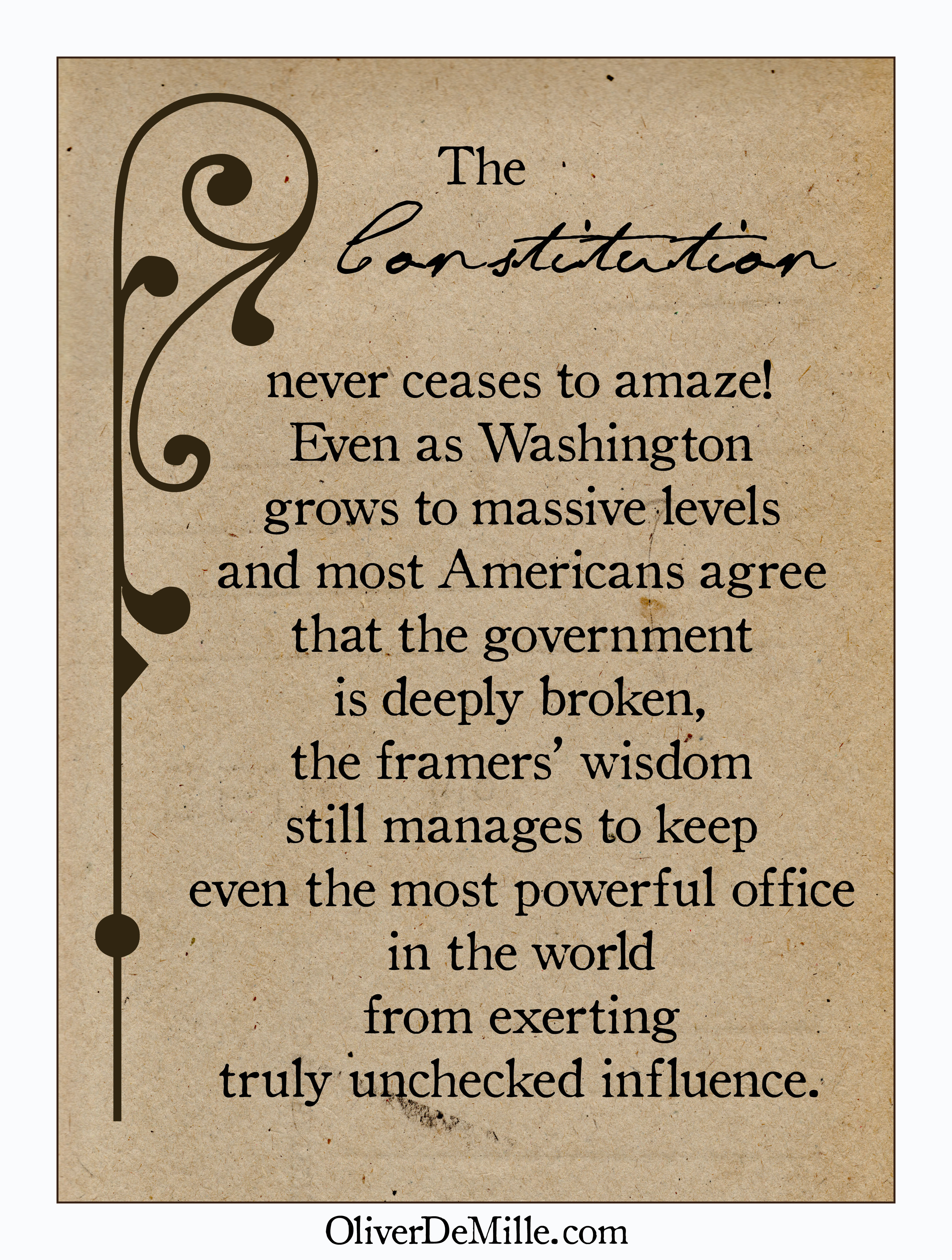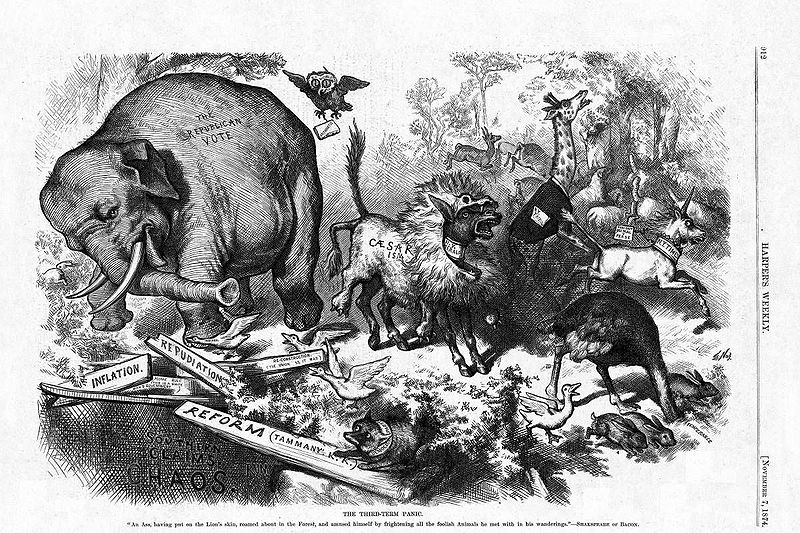Why the Establishment Likes Marco Rubio
November 12th, 2015 // 2:15 pm @ Oliver DeMille
Standings
Whether you like or dislike Hillary Clinton’s politics, she’s proven very effective in this year’s presidential debate. She knows policies forward and backward, on every topic that comes up in both domestic and foreign policy. She’s confident and sharp. She looks presidential to many on the Left and also to many independents.
So far, she’s been much better at debating than Jeb Bush or John Kasich. Donald Trump may improve, but to date he hasn’t shown any great debating skill either. As he puts it, this country needs a leader who will fix the economy and make the military strong again, not just another debater.
Trump has a lot of support for other reasons, but how he’ll do against Hillary on live TV has the Republican establishment concerned—even though his supporters say he’ll be much better in head-to-head matchups than with 8 or 10 people behind the podiums. Of course, the GOP establishment wouldn’t like Trump even if he were the best debater in history.
Likewise, the establishment doesn’t care much for Ben Carson. He isn’t the traditional debater by any means, but when he speaks, a lot of people stop and listen. It would be very interesting to see him debate Hillary Clinton. Who knows how such an event would go?
Many establishment types worry that in the Internet age (where most voters only see 1 or 2 clips from any debate, replayed over and over) Clinton would easily dominate against Carson, Trump, Rand Paul, Huckabee, and even Bush or Kasich. Whether this is accurate or not remains to be seen, but this is their concern.
That leaves establishment Republicans with four main choices: Christie, Fiorina, Rubio or Cruz. Neither Christie nor Fiorina has shown the ability to garner much support from either the GOP base or establishment. Some pundits also feel that Christie or Fiorina could come off looking too harsh against Hillary—perhaps winning on content but losing on likeability.
The Question
Many of the die-hard Republican establishment are now suggesting that the nomination may well come down to Rubio or Cruz. Both are very effective in the debates, and it is easy to picture either of them winning the general election sound-byte battle.
Rubio is young, energetic, knows the issues in depth and detail, polls well among women, Latinos, and swing-state voters, and is sharp, articulate, and good in a scrum. Many pundits predict he’d be especially effective on stage in a series of debates with Clinton. On paper, he’s just what the establishment is looking for (not quite as experienced at governing as Jeb or Kasich, but much better on the debate stage).
As for Cruz, the establishment hardly considered him a real candidate as recently as July. But after months of Trump and Carson leading the polls, they’re a lot more likely to stomach Cruz as the nominee. He has many of the same positives as Rubio, though he doesn’t poll as well among women, swing-state voters, or moderates. Plus he’s against the GOP establishment, not for it.
All this brings us back to a key question: In reality, aren’t Trump and Carson still ahead in many polls? The answer is yes. But a lot of establishment types are still convinced that neither Trump nor Carson will be the nominee. I disagree with their reasoning, because I think the voters will elect the person they want rather than follow the establishment’s recommendations.
But let’s just play along with the pundits for a minute and ask ourselves: if Trump or Carson isn’t the nominee, who will it most likely be? Five months ago, the overwhelming establishment answer to this question was Bush.
But that’s changed. With the image of multiple one-on-one debates against Hillary in their minds, many in the establishment have decided that Bush just won’t shine—while Rubio will.
A Chance
If you’re not part of the establishment, none of this is particularly relevant to your view of the election. But it’s important to understand what is happening in the race, and why. Right now the specter of 2016 debates in the national spotlight against Hillary is reformatting the way GOP elites see the entire campaign.
That’s why the establishment now likes Rubio.
The truth is, this is all good for the Republican base. There’s a real chance in this election to finally elect a president who will actually reduce the national debt (which is now above $154,453 per tax payer), cut the size of government, and reboot the economy. A cynic will argue that this won’t happen no matter who gets elected, but there are candidates who are committed to this—and just might be able to pull it off.
It’s certainly worth a shot–because otherwise our country is in for a lot more painful decline.
If this election had gone the way the establishment predicted, with Bush sweeping the lead, the chance of real change would already be long gone. As it stands, a solid 60% of the GOP electorate wants a serious, major change in Washington and the White House. When they get down to actually voting, we’ll see how it all shakes out.
But there’s still a chance.
Category : Blog &Citizenship &Current Events &Generations &Government &History &Independents &Leadership &Liberty &Politics
Why Chaos in Congress is Good for America
October 20th, 2015 // 4:09 pm @ Oliver DeMille
“Why can’t the two parties in Washington just get along?”
“Why can’t the politicians just stop bickering and work together?”
“With the factional divides in the Republican Party, no Speaker of the House can get anything done.”
“Shutting down the government is a failure of leadership.”
“I wish Washington would just stop fighting all the time.”
 Sound familiar? I’m amazed at how often I hear these words. At the barbershop. At the store. Waiting for my car to get serviced. At a family party. Granted, not every conversation is about politics. Most aren’t, in fact. But when politics does come up in casual conversation, you can usually count on hearing these sentiments—or something very much like them.
Sound familiar? I’m amazed at how often I hear these words. At the barbershop. At the store. Waiting for my car to get serviced. At a family party. Granted, not every conversation is about politics. Most aren’t, in fact. But when politics does come up in casual conversation, you can usually count on hearing these sentiments—or something very much like them.
Yet every one of these phrases shows a serious lack of understanding. The people who utter these words either don’t understand the Constitution, don’t like it, or have decided not to openly show that they understand the Constitution.
In a cultural sense, these words are false. They’re wrong. They’re ignorant. These statements are the opposite of the Constitutional culture established by the Founding Fathers and ratified by our forefathers. And this misunderstanding is literally a much bigger problem for America than anything happening in Washington. In fact, many if not most of Washington’s problems are rooted in this broad misunderstanding.
Specifically: If a lot of the regular people don’t understand the Constitution, our government will be dysfunctional. But not in the way the media portrays. In fact, the problem is almost precisely the opposite of what the media typically tries to spin.
I. Why the Framers Wanted Lots of Tumult
and Conflict in Washington
The U.S. Constitution is based on separations of power and checks and balances. The Framers clearly saw that, through human history, political power has been abused. Almost always, and by every kind of government. And this abuse takes a certain form: Power centralizes in one political entity (sometimes the executive of the nation, whether king or dictator or president; sometimes in the legislative or parliamentary branch of the government; and other times, in judges), and then the bearer of that centralized power abuses it.
This is the story of ancient Greece and Israel, of both the Roman Republic and the Roman Empire, and of the various Germanic, Asian, African, and pre-Columbian American tribes. The same plot is repeated numerous times in the island nations around the world, and in dynasties, feudal eras, and nomadic cultures. James Madison made special note of how this pattern played out in Western Civilization, particularly various Greek city-states and alliances, and a number of German, French and other European princedoms and commonwealths (Federalist 18,19,20).
Madison’s conclusion, which was adopted by most of the Framers, was that no single branch of government should have too much power, and that the only way—the only way—for a people to remain free is for the branches to have the power and duty to effectively check and balance each other (Federalist 47,51).
Madison warned that the people wouldn’t stay free unless such ongoing checks and balances, tumultuous and intense at times, were part of America’s regular fare (Federalist 37,38,53)–what we might call our cultural DNA. In fact, if the three branches of the federal government ever became less than jealously in conflict with each other, Madison warned, the people should be very concerned about their freedoms (Federalist 47,48,51).
In addition, the three major parts of the federal government were created to provide certain vital functions, based on different strengths. They were meant to be:
- The Decisive Branch (executive), to stop foreign aggression
- The Protective Branch (judicial), to maintain the inalienable rights of the people, especially against government abuse of power
- The Chaotic Branch (legislative), to argue, debate, disagree, deliberate, and ultimately pass only a few limited laws that nearly everyone can agree upon
This is the crux of the Constitutional culture the Framers established. Today it remains central to maintaining our freedoms.
II. The Constitutional Culture
the Framers Wanted
Under this system, freedom is in jeopardy if the executive, legislative, and judicial branches aren’t actively checking each other (ibid.).
One of the leading Founding Fathers, St. George Tucker of William and Mary College, called any government where the three branches weren’t at odds and actively fighting each other by the name “tyranny.” Madison said the same in Federalist 47.
The people can only remain free if each branch uses its checks and balances to keep the other branches in line (Federalist 47,48,51).
Essential Chaos
When the branches do this, it is chaotic. But it’s the kind of chaos that happens when the branches fight each other, which is much better than what happens when the branches stop bickering and work together to reduce the power and freedoms of the regular people.
In short, chaos in Washington usually means that the branches are attacking each other, instead of the freedoms of the people. That’s a good thing!
The major checks of each branch were, and are:
- executive veto
- judicial decisions concerning constitutionality
- legislative purse strings
Again, the Framers knew that the use of these checks would be hotly contested, turbulent, divisive, and often very upsetting to those on the receiving end of such checks.
Tough Love
The Framers realized that sometimes a presidential veto would feel disastrous to some people. They also knew that a Court decision of “unconstitutional” or “constitutional” would at times trigger a lot of frustration, and that the Congress using its power of the purse to shut down government if necessary would cause real discomfort.
Madison warned in Federalist paper 1 (the introduction to the Constitutional system) that during such periods of “great national discussion”, the following would happen in America:
“A torrent of angry and malignant passions will be let loose.”
Sounds familiar.
Yet such checks—including vetoes, Court decisions, and Congressional tumult and government shutdowns—were the very basis of the U.S. Constitution. As Madison put it: “Ambition must be made to counteract ambition.” (Federalist 51)
This bears repeating. The Founding Fathers knew the use of a check by one branch of government on another would bring controversies and adversarial contentions. Indeed, “controversy” is mentioned 25 times in the Federalist, and “adversaries” and “contentions” are discussed 40 times.
But for the Framers, the real worry, the big danger, was the “ambition” of people holding government offices. Forms of the word “ambition” appear 62 times in the Federalist. The Founders were willing to allow angry feelings about checks and balances, in order to stop abuses of power by government officials and agencies.
This is the very foundation of the U.S. Constitution. As mentioned above, it is firmly based on the idea that government officials, agencies, and branches that spend lots of time fighting each other will find less time to over-govern or over-regulate the people. Those who understand this reality understand our Constitutional culture. Those who don’t, do not.
III. When You Hear that “Government is Gridlocked,”
Remember that Jefferson and Madison
are Somewhere Cheering!
Today, however, when a discussion about Washington or politics arises, it often turns in the direction of politicians not getting along, or not getting much done. But let’s be clear: if the politicians start agreeing on a lot of things, our freedoms will be voted away more quickly.
The Founders knew this, and in response they purposely established separations of power with checks and balances to keep us free.
As Madison said, quoting Montesquieu, in Federalist 47:
“‘There can be no liberty where the legislative and executive powers are united in the same person, or body…’ or ‘if the power of judging be not separated from the legislative and executive functions.’”
That’s pretty straightforward. “There can be no liberty…” if the checks and balances aren’t used.
Unless government is frequently gridlocked, freedom quickly declines.
The checks and balances matter.
Yet when the House uses its Constitutional power of the purse to withhold funds or shut down the government to keep the president or Court in check, many Americans today somehow think that Congress isn’t doing its job. The truth is the opposite. If the House isn’t using its power of the purse to keep the president and Court checked, then Congress isn’t doing its job.
If the campaigns and debates to elect a new Speaker of the House aren’t heated, passionate, and tumultuous, then Congress isn’t doing its job very well.
If sections of the House aren’t fighting each other, Congress isn’t doing its job. Same with the Senate. Same with all the branches of the government.
IV. The Constitution Works—
We Should Try Following It
When did the majority of citizens stop understanding the Constitution? When did so many of us stop seeing that the separations, checks, and balances are key to our freedoms? Or forget what the actual checks and balances are?
For example, if your Congressman/Congresswoman won’t use the Constitutional power of the purse to fight for freedom, you should elect a new one.
 Ultimately, the majority of American citizens have somehow stopped understanding the Constitutional culture the Framers outlined—with its intense, passionate, turbulent and rowdy conflicts between the three branches of government (and even within Congress). Somehow many voters have been swayed by the modern media view that everything should be smooth, friendly, and without struggle, that politics should be professional, gentlemanly, and efficient.
Ultimately, the majority of American citizens have somehow stopped understanding the Constitutional culture the Framers outlined—with its intense, passionate, turbulent and rowdy conflicts between the three branches of government (and even within Congress). Somehow many voters have been swayed by the modern media view that everything should be smooth, friendly, and without struggle, that politics should be professional, gentlemanly, and efficient.
Indeed the media has convinced too many of us to see the latest political fights and shake our heads in frustration or disgust, when we should be smiling and carefully watching to ensure that the branches of government keep fighting each other—except when the national security is legitimately at stake.
That’s how our Constitutional system is designed, and the result is more freedom for the regular people. Most nations of the world, and of history, would give nearly anything to have such a Constitutional structure with its checks and balances and the freedoms and prosperity they engender.
If we ever actually adopt the type of civil, tranquil, administrative politics many in the media envision, we’ll live in a nation that has lost its freedoms. The fact that serious, vigorous debate and intense disagreement in Congress and other parts of Washington is seen as somehow…bad…is a national tragedy. Such fervent skirmishes and struggles are what the Framers wanted when they designed the Constitution the way they did. This is precisely what is needed to ensure that no one group or elite upper class controls everything.
Furthermore, the emasculation of Congress and its Constitutional power to check the president and Court by withholding funds as needed and shutting down the government on occasion is a major step in the direction of losing our freedoms.
If only more people understood the Constitution.
Next time you hear about chaos in Washington, smile. Smile widely. Grin and take a deep breath. The Framers got it right.
But if you ever hear about a lack of gridlock in the government and laws sailing through Congress in gentlemanly civility, you’ll know that we’re experiencing a massive loss of freedom.
We all need to help more people understand the Constitutional culture of freedom the Founding Fathers gave us, based on lots of chaos and bickering in Washington.
Category : Aristocracy &Blog &Citizenship &Constitution &Culture &Current Events &Education &Featured &Generations &Government &History &Leadership &Liberty
Obama’s (Disastrous) “Small Stick” Foreign Policy Doctrine
October 15th, 2015 // 12:51 pm @ Oliver DeMille
Putin, Iran and Our Escalating National Security Problem
I. The Disaster
 In the last few weeks, Putin has rapidly reversed many of the major gains Reagan garnered for the United States when he faced down the USSR in the Cold War. Amazingly, Russia is now arguably the major power in the Middle East, having moved significant military assets into Syria and created an alliance between Syria, Iran, and now even Iraq.
In the last few weeks, Putin has rapidly reversed many of the major gains Reagan garnered for the United States when he faced down the USSR in the Cold War. Amazingly, Russia is now arguably the major power in the Middle East, having moved significant military assets into Syria and created an alliance between Syria, Iran, and now even Iraq.
This is incredibly big news. A month ago many people were deeply worried about the rise of nuclear Iran; today major nuclear power Russia is bombing U.S.-backed rebels.
Things just got a lot worse.
The Rise of Russian Power
Consider the strategic upgrade for Russia, which is the world’s second largest producer of oil in the world over the past 10 years, now quickly spreading its influence in the oil rich regions of the Middle East. Russian jets and helicopters are now flying daily maneuvers in the area, near 5 of the top 10 oil producing nations in the world (Saudi Arabia, Iran, UAE, Iraq, Kuwait). And the Russian navy has proven its eagerness to act in the area as well.
This at the same time that the Obama Administration’s stunningly weak foreign policy has significantly reduced U.S. influence in the area. In a very real sense, the U.S. has lost the Middle East to Russia as much as it lost Vietnam and North Korea to Russian and Chinese influences in past decades. As David Brooks put it in The New York Times: “3 U.S. Defeats: Vietnam, Iraq, and Now Iran.” (August 7, 2015) And that was written before Russia’s latest aggression.
Imagine the situation if U.S. power continues to weaken, Russian dominance in the region continues to increase, and Putin’s administration gains even more influence over the control and price of world oil. Like it or not, this is a major issue; yet the Obama Administration continues to defend its recent agreements with Iran and its general downgrade of U.S. military strength.
II. Background
 This new reality has an interesting backstory. Listen to a Republican presidential debate, and you’ll hear a chorus of criticism toward the Obama Administration’s foreign policy and national security record. Most Americans—on both the Left and the Right—tend to chalk such rhetoric up to political bickering.
This new reality has an interesting backstory. Listen to a Republican presidential debate, and you’ll hear a chorus of criticism toward the Obama Administration’s foreign policy and national security record. Most Americans—on both the Left and the Right—tend to chalk such rhetoric up to political bickering.
But what some voters don’t realize is that President Obama is a Woodrow Wilson-style diplomat, not an adherent of realpolitik. Whether regular citizens understand this or not, it has serious ramifications for all of us, many of them dangerous for the United States.
Wilsonian diplomacy is based on the idea that agreements made between nations will be honored by both sides. Negotiate, discuss, compromise, then sign a mutual deal. And—Voila!—your work is done.
In this worldview, words are the main thing. You can talk your way out of, or into, almost anything. Once the talking is done, it’s all peachy. “Peace in our time!” Neville Chamberlain announced, sure that the words and paper agreements had done the job. Churchill scoffed.
Where Reagan famously quipped “Trust, but Verify,” the Wilsonians prefer a different approach: “Trust, Trust, Trust.” And the corollary: “Talk, Talk, Talk.” Indeed, they often label a “Trust but Verify” strategy as too aggressive, even warlike. “Give peace a chance,” they demand. And, on face value, that’s a good idea. But without follow up, without effective verification and a strong military, even the best “talk” often evaporates in the face of reality.
Many nations break their agreements. Iran has done so repeatedly. The same is true of Iraq and Syria. Not accounting for this in a negotiation with them is tantamount to national security malpractice.
In contrast to Wilsonian negotiations based primarily on hope and talk, realpolitik argues that nations act for their own national interest, and that aggressive enemy nations are ultimately limited only by actual power. The American framers pitted power against power, governmental branch against branch—in order to curb the abuses they knew were inevitable. Similarly, many commercial contracts openly include exit plans and establish specs for arbitration for the breaches, misinterpretations and misunderstandings that can and do sometimes arise.
In international affairs, realpolitik has a much more effective history than Wilsonian idealism. (The word “idealism” isn’t a criticism; Wilsonianism is actually called “idealism” by many political scientists and historians.) The only Wilsonian presidents in the past century were Wilson, Carter, and Obama. All three left international chaos in their wake.
Specifically, in our time, President Obama has taken a “words and trust” approach to:
- Syria (Assad must go, and crossing the “red line” of using chemical weapons will not be tolerated)
- the Crimea and Ukraine (you cannot invade other countries in the 21st century, Russia)
- Iran (it must come clean on it’s nuclear program, or we won’t make any deal)
- ISIS (we will downgrade and destroy it), and China (I’ve indicated that they must stop engaging in cyber attacks on us, and they agreed).
Really? All of these words by President Obama turned out to be false. All of them. But many Americans aren’t very surprised. After all, such words mirrored certain domestic promises: e.g. If you like your doctor, you can keep your doctor.
Except: you can’t.
And:
- Syria’s use of chemical weapons was tolerated with no significant response.
- Russia was allowed to invade Crimea.
- Now Russia is reinserting itself in Syria, Iran, Libya and Bagdad at pre-1973 levels, foreshadowing major increased conflicts ahead. Syrian refugees are fleeing by the millions. Iran didn’t have to come clean—despite President Obama’s tersely delivered words—and it got almost everything it wanted in the negotiation anyway.
- ISIS hasn’t been downgraded or destroyed. Indeed, it is still growing, and emboldened by all this U.S. weakness, the Taliban is once again stepping up its operations. For example, on September 29, the Taliban attacked and took control of the first major city (Kunduz) it has overtaken since 2001. On top of these serious developments, Putin’s first choice of targets in Syria was U.S. backed rebels. Seriously.
In short, President Obama’s Wilsonian words aren’t working. At least not in the real world.
“Peace Through Weakness” isn’t even a bumper sticker. It’s just plain stupid.
III. The Real Strategy
 And let’s be clear. This is not, as some Republican politicians claim, a case of incompetence in the Oval Office. If we’re honest, we have to admit that Barack Obama is one of the most effective politicians in American history. Just look at the evidence:
And let’s be clear. This is not, as some Republican politicians claim, a case of incompetence in the Oval Office. If we’re honest, we have to admit that Barack Obama is one of the most effective politicians in American history. Just look at the evidence:
- He got Obamacare passed, despite the fact that a large majority of the nation dislikes it.
- He pushed through the Iran deal, even though, again, most of the nation thinks it’s very bad for America.
- He got the debt limit raised repeatedly, even in the face of Republican majorities in both the House and Senate.
- He also led numerous, significant budget increases and massive growth of the federal government.
- His drive to increase the size and scope of the federal government has hardly been stopped by the flaccid speed bump that is the Republican opposition. To date, more has been added to the national debt under President Obama’s watch than during all the presidents before him combined.
In short, this President knows how to get things done. When he ran for office, he had a campaign quiver full of domestic goals—and we’ve seen many of them realized. Not a kinder, friendlier Washington, certainly, but many of his other objectives.
Concerning foreign policy, his main purpose was to stop exporting American exceptionalism and make the U.S. just another industrialized nation—not a superpower, but just another country; you know… like France, maybe, or Japan. In many measures, he’s accomplished this as well. In the next sixteen months of his tenure, he’ll likely do even more.
In fact, when asked on 60 Minutes why his foreign policy has been weak, he responded that is hasn’t been weak, that it has in fact been strong. When pushed on what he meant by this, he noted that his words about global climate change have been very strong indeed.
The truth is, I think this is exactly where his head is. Strong foreign policy to him means talking strongly about things like fighting climate change and lecturing Syria about chemical weapons. Wilsonian words.
In other words, this President did exactly what he meant to do with our foreign policy. As a result, we live in a much more dangerous world. This gutting of our national defense will probably be his biggest and most enduring legacy.
Putin, clearly, has gone the opposite direction. As has China. And Iran. Syria too. And many others.
As bad as this all is for the U.S., imagine how Israel must feel.
IV. Alternatives
 Our overall foreign policy goals are a deeper topic than we have time to fully develop here. Yet it is worth mentioning the highlights. Some argue that the U.S. should happily stay out of the Middle East, and let the various radical Islamic groups fight it out amongst themselves. There is a lot of merit to this strategy. Supporting Iraq against Iran in the 1980s resulted in the extremities introduced by Saddam Hussein. Likewise, intervening to remove Saddam and trying to create a more pro-Western Iraqi government resulted in a power vacuum that has helped ISIS.
Our overall foreign policy goals are a deeper topic than we have time to fully develop here. Yet it is worth mentioning the highlights. Some argue that the U.S. should happily stay out of the Middle East, and let the various radical Islamic groups fight it out amongst themselves. There is a lot of merit to this strategy. Supporting Iraq against Iran in the 1980s resulted in the extremities introduced by Saddam Hussein. Likewise, intervening to remove Saddam and trying to create a more pro-Western Iraqi government resulted in a power vacuum that has helped ISIS.
But sitting back and watching Putin essentially take over Crimea and Syria, establish Russian military bases in the Middle East, fly Russian aircraft and drones in droves around the region, and establish a new axis alliance (with Iraq, Iran, and Syria all working with—and to a certain extent, for—Russia), is a whole different matter. If Russia turns its eyes toward controlling world oil prices and revenues (and this has already begun), the consequences will only destabilize the entire region and could drastically hurt the U.S. economy.
In a stroke, Putin has managed to sweep in and direct much of the $150 billion Iran-deal U.S. payout to Iran in the direction of Russian and Chinese weapons and infrastructure. Moreover, events in Europe, relationships between China and Russia, and Russian-American relations are quickly—and dramatically—becoming more dangerous. Putin simply moved into the Middle East without announcement or fanfare and took over. The White House was, and remains, shocked.
When Russia invaded and took Crimea, President Obama responded with words (of course) of censure, and Western sanctions. The President also called Russia a “regional power,” basically limited to influence in Eastern Europe. He was pointed in his explanation that Russia is no longer a global power, just as he recently called ISIS the jayvee team. But under Putin’s leadership, this “regional power” took over Syria almost overnight (cheaply and easily) and then got Iraq and Iran to join the alliance.
However you feel about American intervention abroad, the result of these developments is a major downgrade to our national security. It’s one thing to avoid getting caught in a Middle Eastern quagmire; but it’s an entirely different thing to turn the reins of power over the Middle East to Putin’s Russia. And it’s even worse to do this while simultaneously downgrading the U.S. military year after year. Not only has the Obama Administration’s policies hurt national security, they’ve significantly downgraded our national defense as well.
V. The Road Ahead
Let’s now turn our attention to briefly considering the bigger picture. We have a serious set of problems ahead. The following are potential existential crises for the United States, meaning that one or more of them will almost surely threaten our very national survival in the years ahead:
- ISIS
- Terrorist Attacks in U.S.
- Russia
- China
- Nuclear North Korea
- Iran
- Russia’s Expansion and Oil Domination in the Middle East
- Economic Recession—or Worse
Even something as simple as continued economic stagnancy could have a hugely negative impact on our families, standard of living, and our children’s future. None of these problems are likely to just go away, no matter how many Wilsonian words our leaders multiply. America will need to wisely consider, plan, and take effective action to deal with all of these major challenges.
On the issue of defense, without a significantly re-strengthened military, the United States is in serious trouble. I’m not by any means suggesting that we need as many interventions as the two Bush presidents felt determined to engage, but a weak military is not the right path to American success. And big words from the White House about how America will use its power–followed by capitulation whenever a foreign enemy ignores the President and attacks our interests with no consequence except more words–isn’t the right course either.
The Obama legacy may well go down in history as the era of “Speak Loudly and Carry a Small Stick.” Again, the President seems genuinely annoyed that he has to deal with foreign issues. We can expect the problems to grow in the months ahead—not just in Eastern Europe and the Middle East, but elsewhere as well.
 Whoever replaces Barack Obama in the Oval Office will have his/her hands full. It was bad enough when Bush left office, leaving massive problems in Iraq and Afghanistan, and an escalating face-off with China–not to mention the beginning of the Great Recession in 2008.
Whoever replaces Barack Obama in the Oval Office will have his/her hands full. It was bad enough when Bush left office, leaving massive problems in Iraq and Afghanistan, and an escalating face-off with China–not to mention the beginning of the Great Recession in 2008.
But let’s be honest: Things are much worse now.
The tinderbox only needs a spark.
Category : Blog &Citizenship &Constitution &Culture &Current Events &Economics &Featured &Foreign Affairs &Generations &Government &History &Leadership &Liberty &Politics
Beware the “Institutionalists”
October 5th, 2015 // 6:44 pm @ Oliver DeMille
by Oliver DeMille
Too Much
 The word “Institutionalist” keeps popping up in the worst places. It appeared when the Supreme Court upheld Obamacare, and the swing vote came from Chief Justice John Roberts. When asked why this Republican appointee would side with justices from the Left, the response was that Roberts is an “Institutionalist”.
The word “Institutionalist” keeps popping up in the worst places. It appeared when the Supreme Court upheld Obamacare, and the swing vote came from Chief Justice John Roberts. When asked why this Republican appointee would side with justices from the Left, the response was that Roberts is an “Institutionalist”.
This means that his primary focus is maintaining or increasing the status and historical legacy of the Court.
Let’s be clear. The central point of Court “Institutionalists” isn’t about providing justice. Nor is it making sure the Constitution is most effectively applied. It’s not even about winning for the principles of freedom.
All of these are important, of course. But the main focus of “Institutionalists” comes down to keeping the institution of the Court as impressive as possible.
Is this really the right top goal for a Chief Justice?
When Speaker of the House John Boehner announced his resignation, he was asked why he didn’t powerfully take on President Obama’s agenda, use every possible tool to reverse Obamacare, or effectively fight against other negative liberal programs. He answered that these things weren’t really possible without too much battling, and that as Speaker he had the responsibility to protect the institution of the House.
Many in the media called him an “Institutionalist,” one whose main goal is trying to maintain and increase the status of the House. Again, his primary focus wasn’t stopping negative agendas from the Obama Administration. Nor was it reversing Obamacare or the terrible Iran deal. It wasn’t about rebooting the economy, nor did it focus on blocking the horrific practices of Planned Parenthood. Rather, instead of all these things, Boehner’s focus was on Institutionalism.
Is this what we actually want from our Speaker of the House?
Senate Majority Leader Mitch McConnell is another “Institutionalist.” His top focus does not appear to be promoting great conservative polices, or even fighting negative agendas from the Obama White House. It seems to be trying to make the Senate as an institution look as good as possible to the media and the general population.
Is this the right focus for the Senate Majority Leader?
Add this all up, and Institutionalism is a very bad agenda. First, note that approval ratings for Congress are incredibly low, below 10%. It’s almost impossible to get more unpopular than Congress is right now. In other words, if the goal is Institutionalism, those promoting it are failing miserably.
The Split
Second, and more importantly, voters don’t send Congressmen and Senators to Washington to become great “Institutionalists.” It’s not a priority—or even an issue at all—for most Americans. In contrast, voters do send their representatives to Congress to do the things they really care about.
The Democrats seem to get this. Harry Reid and Nancy Pelosi certainly weren’t “Institutionalists” when they were in power. They gave their hearts and souls to fighting for the liberal agendas they believe in and campaigned about—using every possible tool and opportunity. In fact, if no opportunity was available, they found a way to make one. And they got most of what they wanted. The same is true of President Obama.
If only conservative leaders would fight for their agendas with half as much purpose and tenacity as such Democrats. When Republicans are in Congressional and Court leadership, they too frequently stop standing strongly for the principles of freedom and fighting for them with all their might, and instead hide behind the idea of Institutionalism.
But, again, when Democrats lead the Congress and Court, they don’t claim Institutionalism. They set their liberal agenda and go after it with all their will and resources.
The result is that when Democrats win elections, they swing the nation widely and effectively in the liberal direction, but when Republicans win elections, they too often weakly hide behind the concept of Institutionalism and don’t fight strongly for conservative ideals. Predictably, even when Republican voters win, they just watch the nation drift more liberal because their own leaders don’t do what they promised.
In short: We get more liberal when Democrats are in national leadership, and we frequently get more liberal when Republicans are in national leadership. If you want to see more values and policies based on true principles of freedom, we better get new leadership.
And this split isn’t limited to Right versus Left. It dominates the internal workings of the Republican Party as well. The GOP Establishment emphasizes maintaining the institutions of government. Yes, it wants Republicans to lead such institutions, but Institutionalism runs rampant in the Establishment. The words “Establishment” and “Institutional” are basically synonymous.
Purpose
In contrast, many Republicans want government to make major changes and really fix our nation. Reverse the $19 trillion debt (by comparison, it was $9 trillion when President Obama took office). End government deficits. Restore our national security to a much higher level. Reboot the American economy.
We want real change. It is desperately needed.
For most Americans, the institutions we want to flourish and thrive are our families, communities, the U.S. economy, and genuine American freedom. We want our elected officials to stop being “Institutionalists” and instead use institutions like the House, Senate, Court and Presidency to do what these institutions were designed for in the first place—actually help the people.
Anyone who has been in the House, Senate, Court, or other government institutions long enough to passionately care a great deal about the legacy and traditions of that institution, has been there too long. It’s time to vote such officials out of office and replace them with someone new, someone who cares a lot more about really fixing America, the economy, and helping the people than about loving the legacy of some institution.
To repeat: A politician who fawns over and lauds his/her government institution like a college alma mater or his church, has been there too long. The institutions aren’t about groupies and aficionados; they exist to help the people. This is especially true of government institutions.
We should shun institutionalism. That’s not what Washington’s institutions are for. And it’s certainly not why we elect our representatives.
Category : Blog &Citizenship &Community &Constitution &Culture &Current Events &Economics &Government &Leadership &Liberty &Politics
How to Realistically End Obamacare and Stop the Iran Deal
September 22nd, 2015 // 11:21 am @ Oliver DeMille
by Oliver DeMille
Emotions and Questions
 A lot of Americans are deeply frustrated. Many of them are downright angry about the direction our nation is taking. We use our power as citizens to change things—through elections. We send Congressmen and Senators to reverse things we don’t like, but they don’t do much. Why? “Because they can’t,” people tell me. “Because the president will just veto whatever they do. Or the Court will just decree whatever it wants. We’ve got no power. Our votes don’t accomplish anything.”
A lot of Americans are deeply frustrated. Many of them are downright angry about the direction our nation is taking. We use our power as citizens to change things—through elections. We send Congressmen and Senators to reverse things we don’t like, but they don’t do much. Why? “Because they can’t,” people tell me. “Because the president will just veto whatever they do. Or the Court will just decree whatever it wants. We’ve got no power. Our votes don’t accomplish anything.”
The Founder’s Way
The American founding fathers knew that situations like this would come up, so they wrote the Constitution in a very specific way. They gave the power of the purse strings to the House of Representatives for two vital reasons:
First, because they knew that the power to fund or defund any government action was the ultimate power in the Constitution. This power affects everything the government does. No budget equals no personnel, no staff, no petty cash, no anything. This is real teeth. And the framers gave it to the House so they would use it!
Second, the framers gave this power only to the House of Representatives. Why? Because Congressmen are elected directly by the voters, and they are elected every two years. Thus if Washington gets off track, the voters can re-constitute the entire House of Representatives every 24 months. The whole thing. And this new House can totally rewrite the budget. All of it .The House can refuse to fund anything, and that thing will go away.
The framers wanted the House to use the purse powers to defund or refuse to renew funding on things the people don’t like—such as Bush’s torture policies or secret big data spying on American citizens, or today’s Obamacare, federal funding of Planned Parenthood, the Iran deal, and other proposals at this level. That’s why the framers set up the Constitution the way they did.
Presidential vetoes, Court decisions, Senatorial refusals to confirm a presidential nomination, and House refusal to funding: these are all routine constitutional tools. And let’s be clear. The power of the purse is the exact level of extreme that the framers made it. The Court can say something’s constitutional and even say this part of government should stay open. The House can decide whether to fund that thing with $3 trillion or with 30 cents.
The framers knew that the president would have the power of the military, the Court would have the power of legal decisions, the Senate the power of treaties—and they wanted the House to have an equal power. This is the people’s power. This is the House’s power. It is pretty much their only real power. If they don’t use it, they have very little power. But if they do use it, they have the most power in Washington.
Indeed, the power of the purse, the House’s ability to simply withhold funding to the government on any new funding proposal, or renewed funding plan, is the “people’s veto” on the president and the Court. Yet today the president uses his veto power all the time, and the Court uses its decision-making power all the time, while the House almost never uses their veto power.
Why? Because when they do, the media convinces the American electorate that “shutting down the government” is somehow not part of the Constitution.
But the truth is the exact opposite. This House veto is absolutely vital.
Check and Balance
“But that’s so drastic,” some people say. “Shutting the government down is out of bounds. It’s extreme!”
Actually, it’s no more drastic or extreme than a presidential veto. Both of these powers were put in the Constitution by the framers for the same reason—the veto power to allow the president to check Congress, and the power over the purse to allow Congress to check the president.
It’s the most basic part of our governmental system. The three branches can check and balance each other. The president by veto, the Court by decision, the Senate by withholding confirmations, and the House by the power of the purse—by withholding funding. The framers did this on purpose. This is the whole point of three separate branches of government operating with checks and balances.
But the only Constitutional teeth the House has against the president is the power of the purse. And if the House never uses its Constitutional teeth against the president, then we’re living under a monarchy, not a democratic republic. The president will just do whatever he decides to do. That’s not freedom.
Our problems in Washington aren’t caused by vetoes and the checks and balances. Our problems are nearly all the result of not following the Constitution with its checks and balances. Just refuse to fund the agenda of any president who tries to use too much power (like sign a treaty with Iran by executive order instead of following the Treaty requirements in the Constitution). For the current Congress: Don’t renew funding of Obama programs until he takes you seriously. Until he stays within the Constitution. Stop funding his agenda, and he’ll stop doing whatever he wants. He’ll be forced to stop the overreach.
Stop blaming the White House, and stop blaming the Court. It’s 100% in the power of the House or the Senate. And the American citizenry needs to know this. If we don’t even know how powerful our votes make us under our Constitution, we’ll just keep getting more and more bad government.
Note: Americans need to know this. Please pass it on…
Category : Aristocracy &Blog &Citizenship &Community &Constitution &Culture &Current Events &Foreign Affairs &Generations &Government &History &Independents &Leadership &Liberty &Politics













